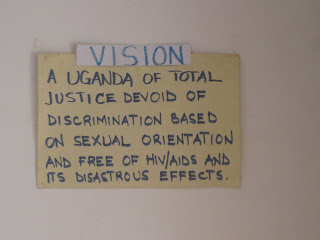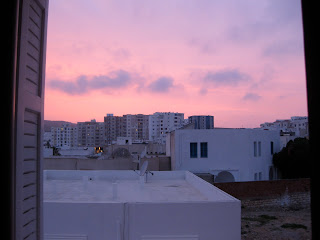Background
I met Keneth and Charles in Uganda last summer during my internship in Kampala at a microfinance finance company. About four years ago, Keneth went to his grandmother’s village, saw kids sleeping without mattresses, sold just about everything he owned (which as the time was eight ducks), bought toothbrushes, and went around teaching kids in the village about dental hygiene. Since then, he has formed a community organization to arrange sponsorships for children in the village. The sponsorships provide school fees, uniforms, shoes, books, pencils, and mattresses to the kids. Keneth also organizes soccer tournaments that attract hundreds of kids from around the community and teaches them about HIV/AIDs during halftime. The organization is called “Hope for African Children’s Ministry.” (http://hfacm.blogspot.com/) Charles’ does similar work because he was influenced by his father, who started providing school fees for one child in his village in 1998. Five years ago, at the time of his father’s death, his father was responsible for helping over forty children. Charles is committed to keeping the spirit of his father alive by continuing to help the children.

Yale students at Masaka
The Trip
Last weekend Keneth and I co-lead a trip of 10 Yale students, who were living in Uganda for the summer, and 3 Ugandans to see the children in his grandmother’s village. Afterwards, I spent an additional day with Charles in his village. During the first part of the trip, we had the opportunity to visit Hope for African Children’s Ministries Office, walk to the community water well, enter children’s home, attend the Sunday church service, and play soccer with the kids. The trip was incredible. I was so overwhelmed by the hospitality. I received three chickens as gifts, which literally was the source of some family’s livelihood. Here I was worried about getting my tennis shoes dirty and people were giving me an animal that provided their daily source of income. And families just kept giving – preparing us meals and giving us fruit, baskets, mats, sugar cane.
It’s difficult. I don’t know how to talk about my trip without sounding trite or playing into Save the Children advertisements that I see as I’m watching late TV – the ones with kids who have descended bellies and flies crawling on their eyes balls as they sit on garbage somewhere in Africa (they never tell you exactly where). And of course, while I was in the village I saw need. But for me, motivation doesn’t come from a guilt trip, but from the relationships I built with the children there and the people who were helping in the village. So to prevent myself from falling into platitudes, I’m going to tell you two stories.
Richard
Richard lives in a village outside of Masaka – the same part of Western Uganda where AIDs was first discovered in humans. The AIDS crisis severely impacted Uganda. At one time, in areas such as this village, the infection rate was about 30%. Richard and his three siblings lives with his grandfather because his parents both died. His grandfather was a coffee farmer, but is now can barely walk. Nevertheless, when he heard I was visiting, he hobbled down the road after me, half naked, to discuss how he could get schools fees for his four children.

Richard, second from the right, with his siblings and grandfather
His grandfather does his best to support his grandkids – but it’s incredibly difficult without a stable source of income. At first Richard was shy, hiding behind his sisters. But by the end of the visit a smile had crept onto his face. He showed me around his house – a house with holes in the roof and part of the front side missing.

Richard's bed
Since his grandfather doesn’t have a job, Richard sleeps next to his sister Jenny on some shirts. His grandfather didn’t ask me for medicine for his own health problems health or shoes or wood to patch up the holes in his house. Instead, he asked me to pay school fees for his grandson, about $20/month, so that his grandson would have the opportunity one day to go to university, and then to work in an occupation besides coffee farming to be able to care for his siblings when his grandfather died.
Juliet
One of the highlights of this trip was getting to meet Juliet, the girl that the group Christians for Social Justice at Yale sponsors. She’s six years old. When she was two, her dad died of AIDS. Her mom is doesn’t have money to afford ARVs, and can’t take care of her children so Juliet lives with her grandmother. Juliet walks about an hour each morning to the well to get water before school. Her grandmother told me that if she could have anything in the world she would get a rain receptor (about $20) so she could be guaranteed to have water for her kids during the dry season and ensure they have more time to spend on schoolwork.

Juliet’s fairly shy, but when she smiles it takes over her whole face. She loves playing netball and singing – she even performed the song “head and shoulders, knees and toes” for me. Because of the sponsorship Juliet now has shoes, clean clothes, and regularly attends school.

When she grows up, she wants to be a doctor.
Future plans
Since the program is new, Juliet is one of only 10 kids who are sponsored. Keneth has 30 addition kids that need sponsors – and he’s constantly turning people away. But Keneth & Charles both of have big plans to expand their organizations – like starting sustainable programs to make the communities self-sufficient. One example of such a program involves buying a male and female pig for a family, which will, in time, give birth to piglets and generates income. As part of the program, families that receive pigs from the organization also help the community in turn by giving some of the piglets to another family, and the cycle continues.
I love that model because it captures some of the most memorial parts of the trip. Being in the village was certainly overwhelming – but the hope was undeniable. Hope that motivates Charles to have a full time job and run a community based organization. Hope that prompts community leaders to donate their crops, share their time, and open their homes to support children in their village. Hope that makes adults committed to ensuring that their kids finish school so they could have a better future – so committed that a grandfather that could barely walk chased me down the road half naked to discuss how he could get schools fees for his four children. I can only imagine what the community would be able to do if there were given resources to enhance income-generating activities.

A Continued Relationship
Keneth & Charles told me that one of his biggest needs is for people to be “their ambassadors” -- to tell the story of the organization and the children looking for sponsors to their friends to increase support – not just monetarily, providing advice, and connecting them with resources. For them, its first and foremost about building relationships with the kids and making sure that everything that is done is in their best interest.

Concrete ways to help:
• Visit Keneth’s website (http://hfacm.blogspot.com/) and learn more about his work. He loves building relationships with people and meeting new people on Skype to talk about the organization.
• Get together with friends or family and sponsor a child, like Richard. If you don’t have the financial resources, you can still start building a relationship with a child via penpals and tell their story to your friends.
• Donate skills: In particular I’m trying to help Keneth and Charles develop their websites and public relations aspects of their organization.
• In terms of support at Yale, we are creating a club that Keneth’s organization as a case study for hands-on community development work – we want to help him register as an NGO, create a community needs assessment, develop income generating programs for the community, and work with existing Yale groups (such as engineers without borders, amnesty, and the global development alliance) to address the needs of clean water and health in the village. If you have any suggestions of resources that would be helpful in this regard, please let me know.

I’m so excited about the beginning of this partnership -- it’s really incredible to witness a love that is so strong it is almost tangible -– a love that connects and protects and empowers.














